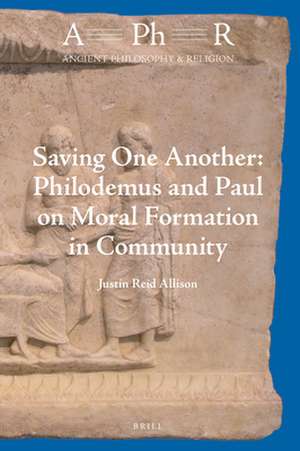Saving One Another: Philodemus and Paul on Moral Formation in Community: Ancient Philosophy & Religion, cartea 3
Autor Justin Allisonen Limba Engleză Hardback – 22 iul 2020
Preț: 704.35 lei
Preț vechi: 858.96 lei
-18% Nou
Puncte Express: 1057
Preț estimativ în valută:
134.78€ • 141.01$ • 111.96£
134.78€ • 141.01$ • 111.96£
Carte indisponibilă temporar
Doresc să fiu notificat când acest titlu va fi disponibil:
Se trimite...
Preluare comenzi: 021 569.72.76
Specificații
ISBN-13: 9789004434004
ISBN-10: 9004434003
Dimensiuni: 155 x 235 mm
Greutate: 0 kg
Editura: Brill
Colecția Brill
Seria Ancient Philosophy & Religion
ISBN-10: 9004434003
Dimensiuni: 155 x 235 mm
Greutate: 0 kg
Editura: Brill
Colecția Brill
Seria Ancient Philosophy & Religion
Cuprins
Contents
Acknowledgements
1 Introduction
1.1 Context, Rationale, and Goals
1.2 Malherbe and Glad on “Psychagogy” in Paul
1.3 Methodological Framework
1.4 Overview
2 Economic Interdependence among Epicurean Friends on the Bay of Naples
2.1 Historical Overview of Philodemus
2.2 The Socio-Economic Location of Philodemus and His Friends
2.3 Economic Interdependence among Friends
3 Philodemus’s Theology of Moral Formation
3.1 Introduction to On Gods and On Piety
3.2 The Epicurean Gods and Their Role in Moral Formation
3.3 Assimilation to the Gods
3.4 Excursus: Realist and Idealist Interpretations of Epicurean Gods
4 Communal Moral Formation in Philodemus
4.1 Introduction to On Frank Criticism (PHerc. 1471)
4.2 Communal Moral Formation as Shared Inquiry (συζήτησις)
4.3 Core Evidence for the Communal Practice of Frank Criticism
4.4 The Conception and Practice of Reciprocal Frank Criticism
5 Economic Interdependence among Christians in Corinth
5.1 The Impoverished Socio-Economic Location of Paul and His Communities
5.2 Interdependent Economic Reciprocity among Poor Believers
5.3 Summary
6 Communal Moral Formation in Paul (1 Corinthians 8:1–11:1)
6.1 The Subject and Situations of 1 Cor 8:1–11:1
6.2 Adaptation to the Weak
6.3 Constructing the Weak
6.4 The Weak’s Construction of the Knowers
6.5 Constructive Reciprocity and Interdependence
7 Communal Moral Formation in Paul (1 Corinthians 12:1–14:40)
7.1 Overview of 1 Corinthians 12–14
7.2 1 Corinthians 12: Divine and Human Involvement in Construction
7.3 The Content and Character of Constructive Speech
7.4 The Effects and Reception of Constructive Speech
7.5 Interdependence in Moral Construction
7.6 Summary
8 Paul and Philodemus in Comparative Perspective
8.1 Socio-Economic Interdependence
8.2 Theology of Moral Formation
8.3 Formative Practice
8.4 Interdependence in Moral Formation
8.5 Concluding Summary
8.6 Pathways for Further Research
Bibliography
Index
Acknowledgements
1 Introduction
1.1 Context, Rationale, and Goals
1.2 Malherbe and Glad on “Psychagogy” in Paul
1.3 Methodological Framework
1.4 Overview
2 Economic Interdependence among Epicurean Friends on the Bay of Naples
2.1 Historical Overview of Philodemus
2.2 The Socio-Economic Location of Philodemus and His Friends
2.3 Economic Interdependence among Friends
3 Philodemus’s Theology of Moral Formation
3.1 Introduction to On Gods and On Piety
3.2 The Epicurean Gods and Their Role in Moral Formation
3.3 Assimilation to the Gods
3.4 Excursus: Realist and Idealist Interpretations of Epicurean Gods
4 Communal Moral Formation in Philodemus
4.1 Introduction to On Frank Criticism (PHerc. 1471)
4.2 Communal Moral Formation as Shared Inquiry (συζήτησις)
4.3 Core Evidence for the Communal Practice of Frank Criticism
4.4 The Conception and Practice of Reciprocal Frank Criticism
5 Economic Interdependence among Christians in Corinth
5.1 The Impoverished Socio-Economic Location of Paul and His Communities
5.2 Interdependent Economic Reciprocity among Poor Believers
5.3 Summary
6 Communal Moral Formation in Paul (1 Corinthians 8:1–11:1)
6.1 The Subject and Situations of 1 Cor 8:1–11:1
6.2 Adaptation to the Weak
6.3 Constructing the Weak
6.4 The Weak’s Construction of the Knowers
6.5 Constructive Reciprocity and Interdependence
7 Communal Moral Formation in Paul (1 Corinthians 12:1–14:40)
7.1 Overview of 1 Corinthians 12–14
7.2 1 Corinthians 12: Divine and Human Involvement in Construction
7.3 The Content and Character of Constructive Speech
7.4 The Effects and Reception of Constructive Speech
7.5 Interdependence in Moral Construction
7.6 Summary
8 Paul and Philodemus in Comparative Perspective
8.1 Socio-Economic Interdependence
8.2 Theology of Moral Formation
8.3 Formative Practice
8.4 Interdependence in Moral Formation
8.5 Concluding Summary
8.6 Pathways for Further Research
Bibliography
Index
Notă biografică
Justin Reid Allison, Ph.D. (2019), Durham University, is Associate Professor of New Testament at Prairie College in Three Hills, Alberta.










